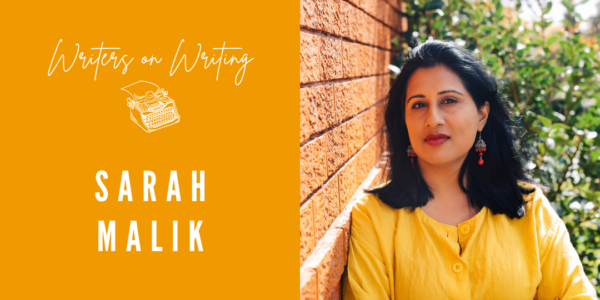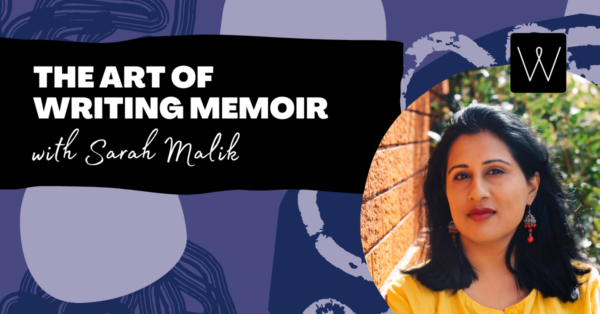
Writers on Writing is our regular conversation with a writer or industry professional about the writing craft, industry insights, and their own practice. This week, we spoke to Walkley-award winning journalist and critically acclaimed memoir author Sarah Malik about The Art of Writing Memoir!
Why write memoir and what are some of your favourite memoirs that display powerful personal perspectives?
For me memoirs are my favourite kind of book, and I’ve read everything! They made me feel less alone – reading Alice Pung’s An Unpolished Gem, Ocean Vuong’s On Earth We’re Briefly Gorgeous, Jeanette Winterson, Tara Westover, Maya Angelou, Raimond Gaita, James Baldwin, Huma Qureshi. They were like, as Camus said, taking an axe to the frozen sea within me. I felt like they were speaking directly to me; and in sharing their lives, their stresses, the challenges of being a third culture kid in the west, the tensions of immigration or family; their struggles with belonging, it made me feel seen; it felt like a validation.
That’s the power you have with your memoir – to illuminate a world and an experience that is yours – to say yes, I exist. I think especially for minority writers, when you’ve experienced so much diminution and erasure in the mainstream; it can be a powerful tool of self-assertion, to talk back, to declare yourself. And there’s nothing as validating as getting messages from people telling me my book made them feel the same way.
How do you practice self-care when writing about emotional and sometimes traumatic personal experiences?
Who will read this? I am terrified. I want to quit. Will I lose all my friends and family? How do I deal with the 2 am panic attacks? Is this self-indulgent? How much do I share and how much do I reveal? They are all normal feelings in writing any kind of book, and the only way out of it is through it! Thankfully, Desi Girl was a culmination of years of being an editor as well as writing my own personal essays and op-eds with SBS, which had given me the muscles to feel confident in telling stories from my life in a safe way. I got used to writing, getting public feedback and learning to feel comfortable about having part of my life story out there.
But writing is not therapy, therapy is therapy, so I would consider your readiness to share things, and whether you have processed them privately already. It’s also vital to get that support through the publication and promotion journey when you’re feeling vulnerable i.e. when reviews come out or big media moments.
In the early stages, just put it all in there and write un-self-consciously, as if no one will read it. Do the re-writes later. There’s so much I didn’t include. It’s important that you don’t self-censor in those early stages or think too much about who will read but just write it for yourself and your ideal reader – someone who will understand exactly what you have to say. You don’t need to spill your guts, you can leave things unsaid, you can leave things for a future book.
As you say in the description for your upcoming course, there are many forms of writing about real life, including memoir, essay and autobiography. Why did you decide to structure your book Desi Girl as a collection of essays instead of as a traditional memoir?
I was really grateful to my publisher for generously agreeing to monthly zoom catch ups and deadlines during the early stages of writing. The essays organically arose out of the things I talked about with her – my obsessions and preoccupations – finding a home, mental health, religion, money, feminism, intergenerational family dynamics, work, racism. Then it was figuring out specific stories to highlight those themes; learning to swim, buying a house and achieving financial independence in a precarious industry, my relationship to reading the western canon, working at my parent’s garage spice shop and our parallel Jane Austen lives of traditional marriage and dawats.
Figuring out a structure that worked for my ADHD brain was key: collaborative conversations, and breaking down the book in smaller pieces felt like it was mimicking my work process as a journalist. It made it much less terrifying than being told to go away and write a whole book by myself. It made sense to make the memoir a series of essays, as I wanted to link my experiences to bigger social themes, on how we as individuals swim in these bigger waters of class, race, and political context that animates and shapes our experiences.
How can writers filter through the nitty-gritty of their lives to identify the most relevant events and details for their chosen life story?
What were your obsessions, blindspots, the relationships that broke or shaped you? Writing is also about specificity, you are writing your life, but you are also writing a scene – a scene that requires tension, skill, art, dialogue, climax and specificity. One of the exercises I do in my writing workshops is encourage writers to look at how we document our lives when we are free from self-consciousness.
There’s an honesty there – in social media posts, old letters, emails, and especially photographs – a particular look of hopefulness as you got dressed for the formal; or a look at a wedding that reminds you of a heartbreak you were suffering; or perhaps some grief you were yet to experience. What emotions do they bring up for you? Is there anything that seems to be a pattern? As you look through the material; not only look at the place you were at; but also the world, your family, and the context you were living in.
Sarah Malik is a Walkley-award winning Australian investigative journalist, author and television presenter. Her critically acclaimed debut collection of memoir stories Desi Girl: On feminism, race, faith and belonging was published by the University of Queensland Press in 2022, and was described by Alice Pung as ‘A triumph! Sarah’s candour, generosity, warmth and insight are a joy and comfort to read. The book I wish I’d had as a young writer’. Her second book Safar: Muslim women’s stories of travel and transformation was published by Hardie Grant, also in 2022. Her writing has been featured in the Sydney Review of Books, New York Times, The Sydney Morning Herald, Daily Life, ABC’s The Drum, The Saturday Paper and The Guardian.
Enrol now in The Art of Writing Memoir with Sarah Malik, on Saturday 31 August, 10 am – 4 pm at Writing NSW.
If you want to be the first to read great advice, prompts and inspiration from our incredible tutors, subscribe to our weekly e-newsletter Newsbite.
More from Writing NSW
Check out our full range of writing courses in Sydney, our online writing courses and our feedback programs to see how we can help you on your creative writing journey. Find out about our grants and prizes, as well as writing groups across NSW, and sign up to our weekly newsletter for writing events, opportunities and giveaways.

